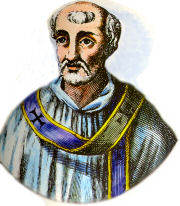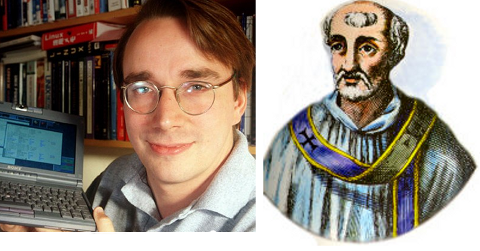![]() The Universal Exaltation of the precious and life-giving Cross XVII century – icon from village of Belovo Trqvna region
The Universal Exaltation of the precious and life-giving Cross XVII century – icon from village of Belovo Trqvna region
he Universal Exaltation of the Precious and Life-Giving Cross (Elevation of the Cross)'s day is feted on 14th of September each year in accordance to the new calendar order, according to old church calendar, the Church celebrated it on 27th of September.
The day is marked by a strong fasting, for short we refer in Bulgarian to this big Church feast as (The day of the Cross / Krystov den).
The Holy Orthodox Christian Church does worship the cross 4 times a year on:
- Third Sunday after the start of the Great Lent
- Holy Friday (Good Friday)
- 1st of August
-
and
- 14th of September – The Exaltation of the Holy life giving Cross
On this day, we the orthodox christians go to the Church and admirationally bow and kiss the Holy Cross on which our Saviour Jesus Christ suffered for our salvation.Through his cross suffering our Lord has granted to all of us the Christians an unbeatable "weapon" against evil and sin.
Through cross Christ has been victorious over sin and death.
According to old Church tradition, on the day Christian people were asking for the priest to go to their homes and do vodosvet (sprinkle their houses with a blessed holy water).Vodosvet is one of the Orthodox Church mystics, there is a specific prayers begging God for forgiveness of sins, asking for good health and blessing. The prayers are being red over a vessel containing clean water. Finally he blesses the vessel with Water with the life Giving cross 3 times (as a symbol of the Holy Trinity). Then the priest uses a the cross and a tiny piece of twig to sprinkle all the people and objects in the house.
On the holy exaltation of the holy cross feast we also celebrate also the following 3 events:
1. The miraculous appearance of the Holy Cross to emper st. Constantine
2. The finding in Jerusalem of the Holy life-giving cross in Golgotha
3. The return of the Life-giving cross from persian captivity
On 14th of September, according to Church tradition saint John of John Chrysostom has give away his spirit and joined the assembly of saints of God, however because of the Exaltation great significance, the church holy fathers decided that this is celebrated on 13th of September.
The Antiphon for the Exaltation of the Cross feast is singed and translated from Slavonic its meaning goes like this:
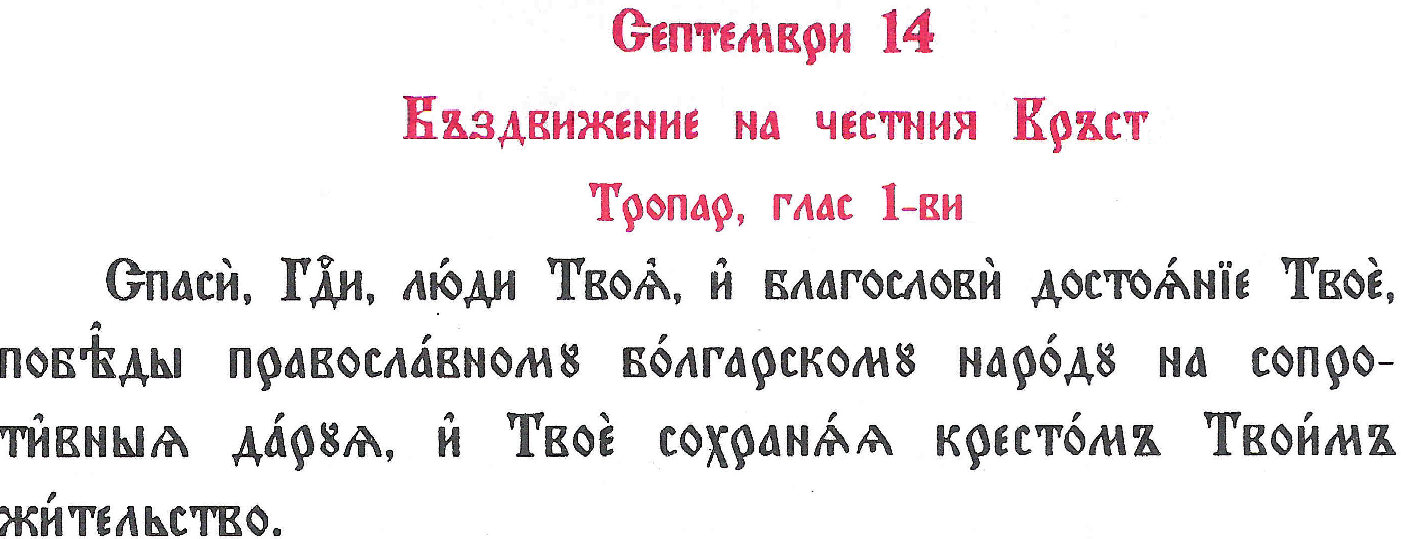
Troparion of the Exaltation of the Holy Cross voice 1 / Тропар на светия Кръст, глас 1
Спаси, Господи, люди Твоя и благослови достояние Твое, победы на сопротивныя даруя, и Твое сохраняя Крестом Твоим жительство.
Troparion voice 1
Save Oh Lord, your people and bless possession, grant us oh Lord a victory over our enemies and save your inheritance with your Cross
Troparion voice 2
You've been lifted willingly on the cross, grant you mercies to your inheritance oh Christ our Lord,
stregthen the spirits of the pious king and to your people,
grant us victory against our enemies,
Surround us with peace and with peace give us unbeatable victory
In the Glorification part of the Holy Liturgy feast service its singed:
We magnify you, oh Christ life giver,
and your Holy cross, because you have saved us from the enemy.
What does the Church tradition says about the finding of the holy cross of Christs sufferings?
After the Church crucifixion of Christ, according to the tradition of that times, the weapon for punishment from this kinds – the cross tree was buried in the ground on the same place, where the punishment was executed.
Following the tradition on Gologthas where Christ was crucified was buried the cross used for crucifixion.
In later times, emperor Adrian in his attempt to destroy christianity and the place of pilgrimage of Golgotha has issued an order to built a pagan shrine on the same place.
Later under the reign of Emperor st. Constantine the cross appeared in the sky in a miraculous way and again under his reign the Golgotha place which means literally translated( the place of the Skulls) was discovered.
Third Sunday after start of the Great Lent – Sunday of the Veneration of the Holy Cross
Today 03.04.2021 we the orthodox are in the blessed period of the Great Lent. It is no coincidence the Church has set this feast on exactly this date. It is set on 3rd week of the 43 days (7 Weeks) that lasts the fasting period on the Eastern Orthodox Christian church because this is a little bit less than the half of the lent period. We know by the experience of spiritual fathers that once we start the job the hardest periods are nearby in 40% once the work is done and in that times it is a desire of the person to leave and quit the job but if he perseveres suddenly when the set goal is progressing this is overcome but then again in the end of the period of the goal to complete we start desiring to quit the started job and loose all energy put together, as a plan of the evil which wants us to always loose energy (both spiritual and physical) and never gain anything. Thus the Church set the feast of the Exaltation of the Cross to give us a way to attain new energy for the cross to be able to goodly continue in the deed of the lent. By the cross and his glorious power hence the spirit of despondency is crashed down and we're strenghtened and rejoice for the great glory our God has given us.
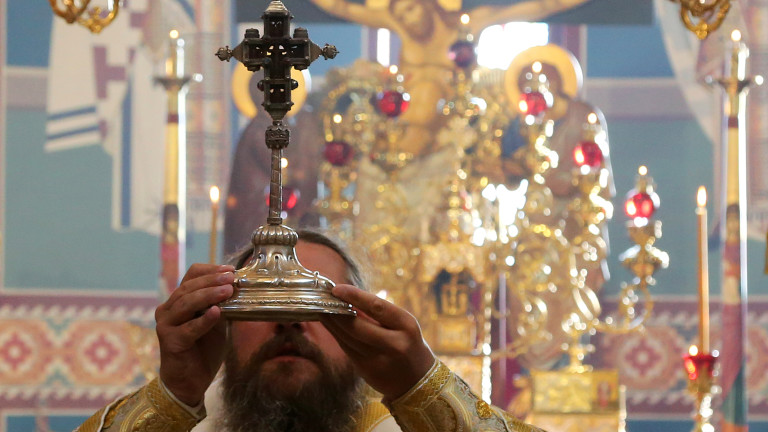
The exaltation of the cross is also a feast of everyone celebrating his own cross. The victory over death and everything was once fulfilled by Christ on the Cross. The humanity is saved already but it is up to everyone's free will to accept this salvation or not. The path is set it is the path of the Cross of Christ, meaning acceptance (humility) of all the unpleasant life events and situations, accepting everydays unexpected changes believing that this is God's providence and cross for each one of us, accepting the pain and suffering that is part of the personal cross we hold, accepting that one day our beloved and friends will pass away from this life, accepting the fact we age and the aging guarantees sufferings of the body but the spirit is refreshed by the grace of God, accepting all and enduring everyhing for the sake of the cross …
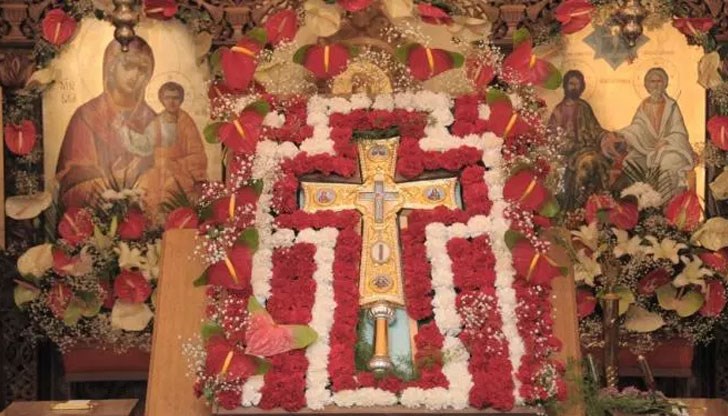
The cross is a holder of the Universe and there is no power that will ever overwhelm it as it is said in the Church singings The Cross is the Holder (binds together) the whole universe. It is by the Cross all the evil has been conquered and life eternal has been giving. The path of the cross is the suffering, this is hard for the modern man to accept as we have been set to believe the only measure for success is prosperity, personal well being, physical health, posessing things. On the contrary the Christian says the most blessed and best thing one can have is the cross meaning personal suffering for and with Christ. By the suffering of the Cross Christ has glorified the bodily flesh he was possessing while being on earth in the body. By the Cross Christ has become the one begotten of all the sons of God. By the cross saints has conquered all evils and has sanctified, by the cross we still continue to progress in the goodness.
Let with the Holy miracle making power of our Saviour's cross by the prayers of all the Saints and our Theotokos (Holy Virgin Merry) God grant to all of us christians victory of our enemies! Amen
